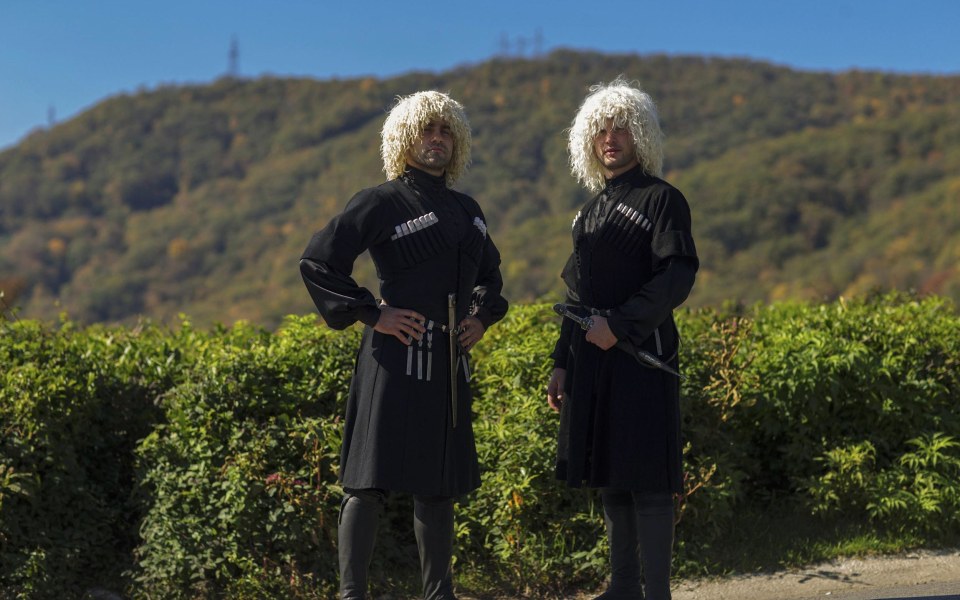http://www.nbcnews.com/storyline/russia-terror/who-are-circassians-why-are-they-outraged-sochi-n23716
Who Are The Circassians, And Why Are They Outraged At Sochi?By Alexander Smith and Ghazi Balkiz
Only one day old, the Sochi Olympics have already proved the most controversial games in decades. But while gay rights, Islamic terrorist threats and bleep Riot have stolen the headlines, the Circassian ethnic group has a far older grievance with Sochi, a city it says is steeped in 150 years of bloodshed.
Who are the Circassians?

The Circassians are an ethnic group from the North Caucasus, an area in southeast Russia between the Black and Caspian seas. (The photo above shows men dressed in typical Circassian style near Sochi in October.) Activists say the Sochi Olympics is an "outrage" because the event falls on the 150th anniversary of an alleged genocide by Russian troops in 1864, a massacre that Russia denies. The Circassians' anti-Sochi protests around the world have been peaceful, but their cause has now been taken up by computer hackers and militants in the North Caucasus.
How will this affect the Sochi games?
The host city has particular significance to Circassians because one of their tribes, the Ubykh, were the region’s original inhabitants. According to the Circassians, Tsarist troops massacred or deported their people to Turkey, where many later perished. Krasnya Polyana, the town where many of Sochi's mountain events will be held, translates to "red glade" and gets its name from the blood spilled by Russian invaders, according to Glen Howard, an expert on the region and president of the Jamestown Foundation, based in Washington, D.C.
"This was the site of the last big battle of the war, and for the Circassians it is holy ground - it's like our Gettysburg," Howard said. "Imagine if someone came and built an Olympic theme park at Gettysburg."
President Vladmir Putin has further angered the Circassians because he has not acknowledged their historical presence or any of their grievances. In a bid to highlight the issue, activists in what is now a Circassian global diaspora set up the No Sochi organization.
The group led protests in London, Vanouver and at the United Nations in New York and penned an open letter to the Olympic International Organizing Committee highlighting what it called "a period of unprecedented and inhumane ethnic cleansing." And a delegation of Circassians from Jordan, Syria, Turkey, Israel, Canada, Germany and the United States traveled to the North Caucasus last year to visit historic sites of their ancestors' homeland.
But now that the games are on, their message has been adopted by more sinister elements.
Members of a Circassian ethnic group shout slogans during a protest against the Olympic Winter Games 2014 in front of the Russian Consulate in Istanbul, Turkey,on Sunday.
A hacking group called Anonymous Caucasus announced on Twitter that it was urging its members to take action against Sochi-related sites in revenge for the alleged Circassian killings 150 years earlier.
But Howard said the hackers were clearly not actually associated with Circassian groups, who have been for the large part peaceful, and he called the hack attacks mere opportunism. His point was perhaps illustrated by the hackers' targeting of the Jamestown Foundation and the No Sochi website.
Vistors to the games were warned by the Department of Homeland Security that these hackers could target their cellphones and use them to spread viruses.
What about other threats from other groups?
While not directly linked to the Circassians, another group that has adopted their message is the Caucasus Emirate.
Known in Russia as the Imirat Kavkaz, or IK, this loose network is led by Dokka Umarov, a Chechen national sometimes referred to as "Russia's Bin Laden." It was established in 2007 with the aim of establishing strict Islamic law, called Sharia, in the North Caucasus.
Evoking the Circassians' plight, Umarov said in a video last year: "We know that on the bones of our ancestors, on the bones of many, many Muslims who died and are buried on our territory along the Black Sea, today they plan to stage the Olympic Games."
The Caucasus Emirate has already made an impact on the games after one of its member groups, Vilayat Dagestan, claimed responsibility for two deadly bombings in the Russian city of Volgograd in December that killed 34 people. They also said they had a "surprise" in store for Russian President Vladimir Putin and the Olympic tourists.
But Matthew Light, an assistant professor of European, Russian and Eurasian studies at the University of Toronto, said these groups should be seen in the same opportunistic light as the hackers.
"Umarov claims to represent the Islamic terrorists in the North Caucasus and it's very convenient for him to use the games to demonstrate that he can wreak havoc," Light said. "But the fact that he claims to identify with the Circassians grievances does not mean he is associated with them."